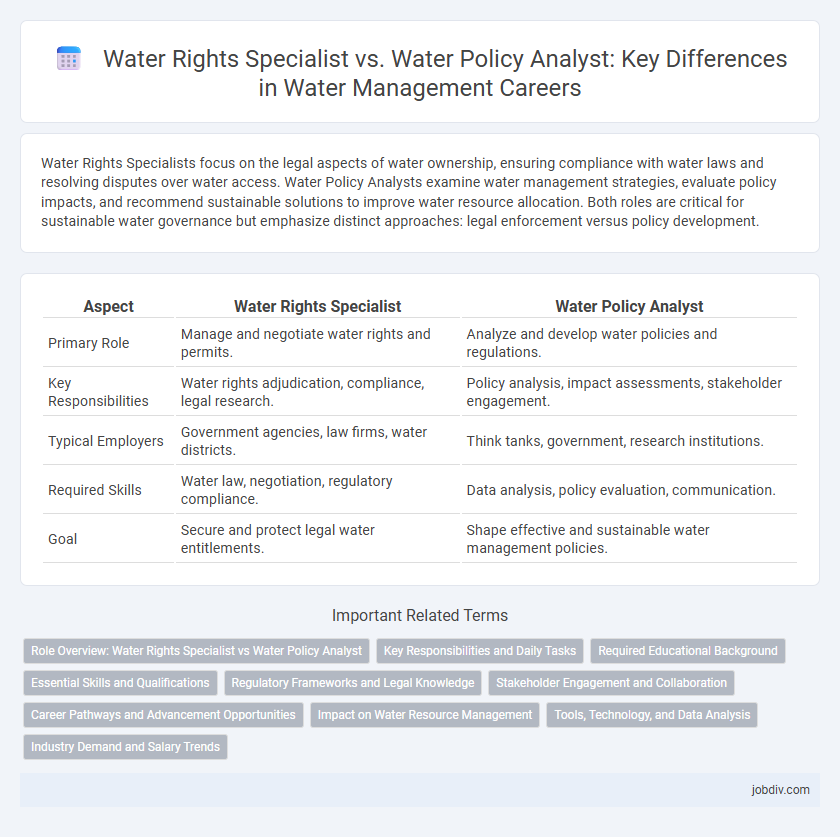Water Rights Specialists focus on the legal aspects of water ownership, ensuring compliance with water laws and resolving disputes over water access. Water Policy Analysts examine water management strategies, evaluate policy impacts, and recommend sustainable solutions to improve water resource allocation. Both roles are critical for sustainable water governance but emphasize distinct approaches: legal enforcement versus policy development.
Table of Comparison
| Aspect | Water Rights Specialist | Water Policy Analyst |
|---|---|---|
| Primary Role | Manage and negotiate water rights and permits. | Analyze and develop water policies and regulations. |
| Key Responsibilities | Water rights adjudication, compliance, legal research. | Policy analysis, impact assessments, stakeholder engagement. |
| Typical Employers | Government agencies, law firms, water districts. | Think tanks, government, research institutions. |
| Required Skills | Water law, negotiation, regulatory compliance. | Data analysis, policy evaluation, communication. |
| Goal | Secure and protect legal water entitlements. | Shape effective and sustainable water management policies. |
Role Overview: Water Rights Specialist vs Water Policy Analyst
Water Rights Specialists focus on securing, managing, and enforcing legal entitlements to water usage, often dealing with permits, compliance, and dispute resolution related to water access. Water Policy Analysts evaluate and develop policies that govern water resource management, regulatory frameworks, and sustainability initiatives, using data analysis and stakeholder engagement. Both roles are critical in balancing resource allocation, but Specialists operate on legal and operational fronts, while Analysts concentrate on strategic policy formulation and evaluation.
Key Responsibilities and Daily Tasks
Water Rights Specialists manage allocations and legal compliance related to water use, ensuring stakeholders adhere to state and federal water laws. Water Policy Analysts evaluate and develop policies addressing water resource management, analyzing data to recommend sustainable practices and regulatory frameworks. Daily tasks for Water Rights Specialists include reviewing permits, negotiating rights transfers, and resolving disputes, while Water Policy Analysts conduct research, prepare policy briefs, and collaborate with governmental agencies and environmental organizations.
Required Educational Background
A Water Rights Specialist typically requires a background in environmental law, natural resources management, or water resource engineering, often holding a degree such as a Juris Doctor (JD) or a Bachelor's/Master's in environmental science or civil engineering. A Water Policy Analyst generally needs a degree in public policy, environmental studies, or economics, with advanced knowledge of regulatory frameworks and water resource economics often gained through a Master's in Public Policy (MPP) or Environmental Policy. Both roles demand a strong understanding of water laws and policies, but specialists emphasize legal expertise while analysts focus on policy evaluation and development.
Essential Skills and Qualifications
Water Rights Specialists require in-depth knowledge of water laws, legal research skills, and expertise in negotiating water use agreements, emphasizing regulatory compliance and property rights. Water Policy Analysts focus on analytical skills, data interpretation, and policy development, often requiring proficiency in environmental science, economics, and stakeholder engagement to shape sustainable water management strategies. Both roles demand strong communication skills and understanding of regional water issues but differ in their primary focus on legal frameworks versus policy analysis.
Regulatory Frameworks and Legal Knowledge
Water Rights Specialists possess in-depth expertise in water law, focusing on the acquisition, transfer, and enforcement of water rights under complex regulatory frameworks. Water Policy Analysts evaluate and develop policies by analyzing legal statutes, regulatory impacts, and governance structures that influence water resource management. Both roles require a strong understanding of federal, state, and local water regulations, but Specialists emphasize legal adjudication while Analysts concentrate on policy formulation and regulatory compliance.
Stakeholder Engagement and Collaboration
Water Rights Specialists engage directly with stakeholders such as landowners, government agencies, and indigenous groups to negotiate and clarify water usage entitlements, ensuring compliance with legal frameworks. Water Policy Analysts collaborate with diverse stakeholders including policymakers, environmental organizations, and community groups to develop and assess water management strategies, focusing on sustainable resource allocation. Both roles require strong communication and facilitation skills to balance competing interests and promote effective water governance.
Career Pathways and Advancement Opportunities
Water Rights Specialists focus on securing legal entitlements and managing water allocations for individuals, businesses, or governments, often advancing to senior negotiation or regulatory roles. Water Policy Analysts evaluate and influence water-related policies, progressing towards positions in governmental agencies or think tanks shaping regional and national water management frameworks. Both career paths offer advancement through specialization, leadership roles, or transitioning into consultancy with an emphasis on sustainable water resource management.
Impact on Water Resource Management
A Water Rights Specialist ensures legal compliance and protection of water allocations, directly influencing water distribution and sustainable use in specific regions. A Water Policy Analyst evaluates and develops regulatory frameworks, shaping broad water resource management strategies to address environmental and community needs. Both roles critically impact water availability, conservation, and equitable access through legal enforcement and policy innovation.
Tools, Technology, and Data Analysis
Water Rights Specialists utilize geographic information systems (GIS) and legal databases to assess water ownership and usage rights, ensuring compliance with regulatory frameworks. Water Policy Analysts leverage statistical software, environmental modeling tools, and big data analytics to evaluate the impact of water policies on resource management and community access. Both roles rely heavily on remote sensing data and hydrological modeling to inform decision-making in water governance.
Industry Demand and Salary Trends
Water Rights Specialists focus on managing legal entitlements to water use, experiencing steady demand in agriculture and municipal sectors with average salaries ranging from $60,000 to $85,000 annually. Water Policy Analysts analyze and develop regulations to ensure sustainable water management, commanding higher salaries typically between $70,000 and $95,000 due to their critical role in environmental policy and government agencies. Industry trends indicate growing opportunities for both roles driven by increasing water scarcity and regulatory complexities, with Water Policy Analysts seeing slightly faster salary growth linked to expanding climate resilience initiatives.
Water Rights Specialist vs Water Policy Analyst Infographic

 jobdiv.com
jobdiv.com